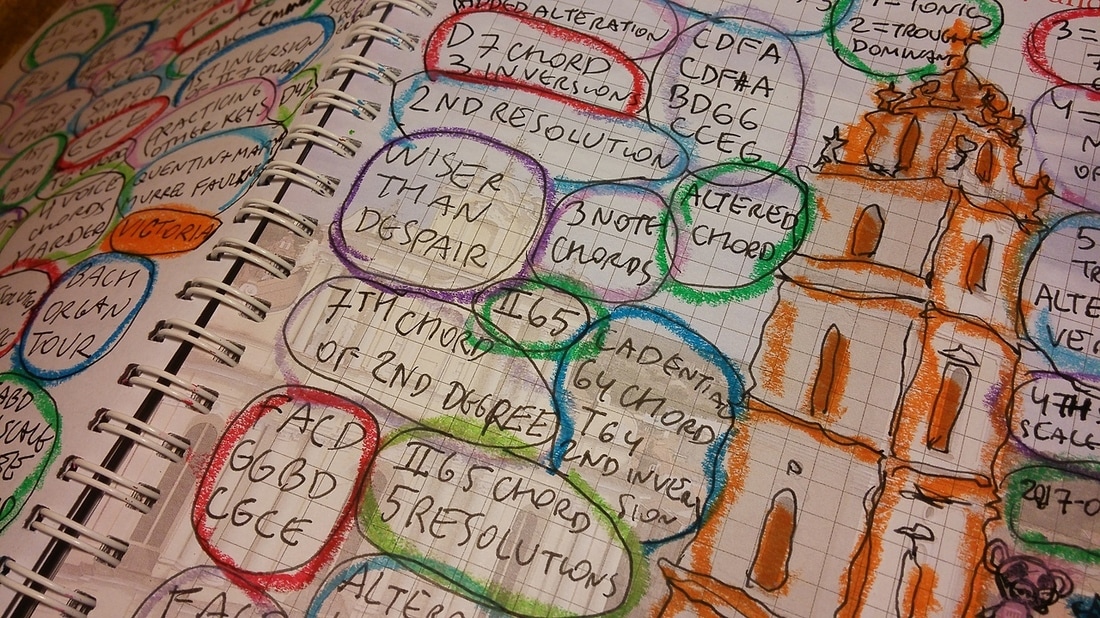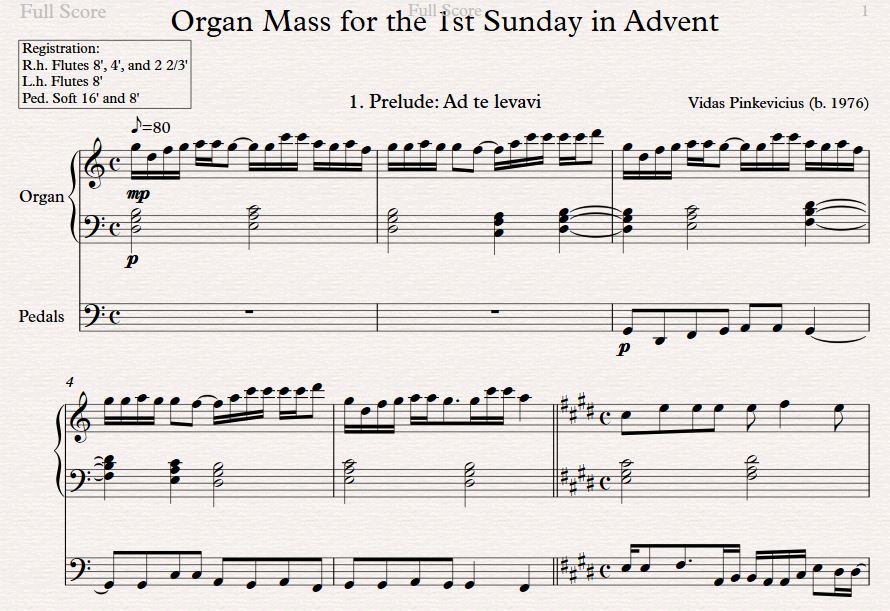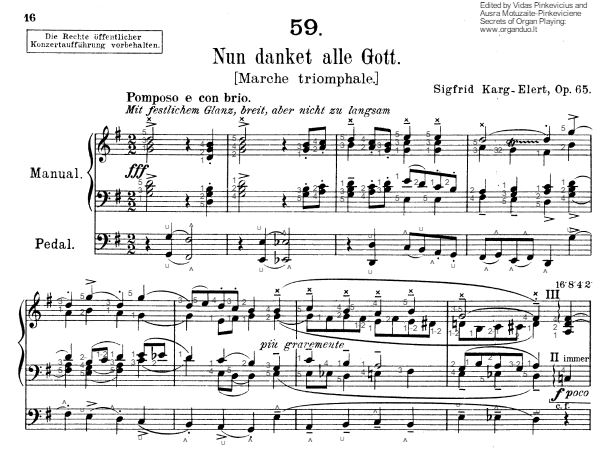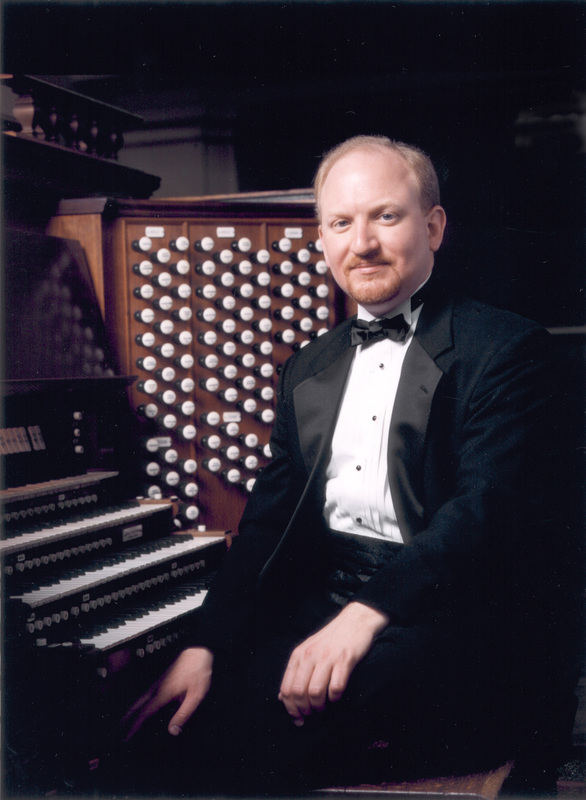|
Vidas: Hi guys, this is Vidas.
Ausra: And Ausra. V: Let’s start Episode 184 of #AskVidasAndAusra podcast. Today’s question was sent by Tony. And he writes: Dear Vidas, Thanks for your very helpful guidance on organ playing. I've played for 55 years, and am still learning! Perhaps some of your web-followers might appreciate a list of Bach chorale preludes suitable for Holy Week? I'd be very grateful for this, as they seem to be scattered over many books and collections. With much appreciation, Tony I think, Ausra, this is a great question to discuss Orgelbüchlein Chorales, don’t you think? A: Yes, because Orgelbüchlein has quite a few that suit us for Holy Week. V: For example, “O Lamm Gottes, unschuldig”--we’re looking at the score right now, and it says it’s a canon, right? A: Yes. V: Where is the canon, do you know? A: Well, you can see it right away. It starts in the LH, and then goes to the RH. V: The canon...What about--where is the cantus firmus, here? A: It’s in the bass. V: In the bass. A: In the pedal. V: And in the alto. A: Yes. V: But the interval between the bass and the alto is not an octave, but a fifth. A: It’s a fifth. V: So it’s a canon of the fifth. A: But also, you can see that the same--actually, the accompaniment that starts right away in the LH is repeated then a half measure later in the RH. V: Right. A: So you not only have a canon between cantus firmus, but you have it in 2 other voices, as well. V: Mhmm. How would you register it? Reed, probably, in the pedals, or not? A: Well, yes, something more audible. You need to hear the bass. V: But… A: But also, you know… V: Which descends lower--the LH or the pedals, here? A: Hmm, it depends on how you’re registering. If you’re registering pedal with a 16’, then the bass goes lower. V: I mean, which voice has the bass? LH, or the pedals, here? A: LH. V: Does it mean that the pedal part should not have a 16’ stop here? A: Yes, I think so. I think it should be based on an 8’ stop. V: And then probably the rest of the voices can be played on a single manual, right? Or not? A: Probably, yes. V: Because look--the span between the hands is sometimes too big for one hand, right? A: That’s right, yes; you have to help sometimes, to play some music from the treble clef from your LH. V: Mhmm. The next chorale, “Christe, du Lamm Gottes”--is it also suitable for Holy Week, or not? A: Yes, I think so, because you know, “Lamb of God”--definitely I think it’s sort of a little bit similar in his meaning with the first one. V: Mhmm. And if I’m counting voices correctly, here are 5 voices, now. A: Yes. V: And the canon is at the 15--basically, an octave plus a fifth. Where is this canon? I have to find it...Oh, between the soprano, right, and the tenor in the LH. A: Yes. V: Right? A: But then it starts in the bass, too. V: And then, probably, you need 2 manuals for that, right? A: Yes, I think so, yes--definitely. V: Mhm. But 2 voices would be played on each manual, so basically, not necessarily a reed--not necessarily a solo registration, but kind of a combination of stops. A: I think this chorale might sound good on the soft stops. Because look at all the descending melodies--all the time going down. V: Mhm. A: So you probably wouldn’t want to add mixtures or something--louder reeds, for this chorale. V: And you’re right--pedals could have 16’ stop, right? A: Yes, yes. V: Because it’s not a solo stop. A: That’s right. V: In the tenor range. It’s real bass. Maybe--how about 8’ and 4’ flute combinations in each hand? A: I think that’s what I do. And 16’ and 8’ in the pedal. V: Mhm. The next chorale is also a canon--“Christus, der uns selig macht.” A: Yes. V: Between the soprano and bass, right? A: That’s right. V: Do you think that it could be played louder? A: Could be, although we are talking about Holy Week, so I would not suggest to play very loudly during Holy Week. V: Mm, I see. A: What about you? What do you think? V: Depends on your congregation--how conservative it is. Right? A: But I think all that waiting, you know, for the drama that happens on Good Friday... V: Mhm. A: Or...Good Friday--what is it called in English? V: Good Friday. A: Good Friday, yes. V: The next is “Da Jesus an dem Kreuze stund.” That’s definitely the chorale suitable for Holy Week. A: Yes, because it means, you know, “When Christ was on the cross.” V: Mhm. And the texture here is very simple, right? Soprano has the cantus firmus, and the rest of the voices have figurations and imitate each other. Am I right? A: Yes, that’s right, yes. V: Would you play it on one manual, or on two manuals? A: I would play it on one manual. What about you? V: On one manual, because, let’s say, in the sixth measure, between the alto and the tenor, you have intervals of more than an octave. So there’s no way you could play it on one manual--the 2 inner voices. So therefore, you need all 3 parts together on one manual, and sometimes playing alto in the LH, sometimes in the RH. A: Yes, that’s right. V: Most of the time in the RH. Mhm. And now we come to the most famous chorale from the Orgelbüchlein suitable for Holy Week: “O Mensch, bewein dein Sünde groß.” And this is an extremely slow tempo, right Ausra? A: Well, yes--yes and no. It’s a slow tempo, but it doesn’t feel like so slow, because it has that ornamented cantus firmus in the soprano, which has many ornaments and 32nd notes. So sort of despite the Adagio assai tempo, which is really so...it still...the music still flows. V: Mhm. It’s in a beautiful E♭ Major key. And for that, you probably need some solo registration in the RH. A: Oh, yes, definitely, you have to have it. V: What kind of options do we have here? A: Well, you could have some sort of reed… V: Mhm. A: It would be one of the options. Also you could use a cornet. V: Maybe principal. A: Yes, maybe principal too. It depends what you will put in the accompaniment, LH, and the pedals. V: Mhm. A: And of course, you know, you need to find out which stop is the nicest on the organ, too. V: Mhm. To have a singing quality. A: Yes. V: Don’t forget to play adagissimo at the end--to slow down extremely. A: Yes. At that last cadence. V: Mhm. And the last choice from Orgelbüchlein for Lent and probably for Holy Week would probably be, “Wir danken dir, Herr Jesu Christ, dass du für uns gestorben bist.” What does it mean? A: “We thank you, Lord Jesus Christ, that you have died for us.” V: Uh-huh. It’s a little bit joyful, right? This texture, and faster tempo, I see. A: It feels like in this chorale, you already have that feeling of what will soon happen, you know--that the Resurrection will happen soon. V: Mhm. Excellent. And it also has 4 voices--3 lower parts imitate each other, and the cantus firmus is in the soprano. A: That’s right. V: So guys, that will be a great place to start, right Ausra? A: Yes. V: It’s not terribly difficult; some of them are, but doable. Of course, it depends on your level of advancement. A: Yes. I’m just wondering why Bach wrote so many of those Holy Week chorales based on canon technique. Don’t you find that it’s odd?. Maybe he was exploring canon technique at that time? V: Yeah, he was probably creating this collection as a compendium of all possible techniques and textures suitable for chorale development. A: That’s right. V: And then later he stopped, because, as we think--or, not only we, but common scholarship--thinks that he got carried away with larger projects. A: Yes, that’s true. V: Okay! Thank you so much, guys, for listening. We hope you can apply our advice in your practice. Please send us more of your questions; we love helping you grow. This was Vidas! A: And Ausra. V: And remember, when you practice… A: Miracles happen.
Comments
AVA166: How To Handle Large Quantity Of Music For Prelude, Postlude, And Offertory Every Week?2/26/2018 Vidas: Hi guys, this is Vidas.
Ausra: And Ausra. V: Let’s start episode 166 of #AskVidasAndAusra Podcast. This question was sent by David and he writes: Dear Vidas and Ausra, At the churches where I play, the organists have to play 2 or 3 hymns every Sunday, plus a prelude, postlude, offertory, and Doxology (old 100th), and sometimes accompany a choir anthem as well. That is between 6 and 8 pieces every week. Do you have any suggestions how to handle that quantity of music? Especially the Prelude, Postlude, and Offertory... Thank you! V: That’s a lot of music every Sunday. A: Yes, but that’s life of the parish organist. That’s what we did when we worked at church. V: Do you remember the time when you first started playing in church in Vilnius. A: Yes, I remember it was the second year of my organ study at the Academy of Music I had to work at church. V: Did you have to play the hymns only or also some organ music. A: Well, I had to play both. Plus because it was a Catholic Church we had lots of other stuff going on playing such things like litanies for example, and Psalms and so on and so forth. V: And the masses were not only on Sundays but every day. A: Yes, every day and we had that you know Adoration hour of the sacrament. So also every day. And this was sort of a little bit of nonsense because we would have to play two hymns at the beginning of it and two at the end of it. And it lasted for like an hour and the church was unheated and it was horrible, horrible you know to spend those fifty minutes in that cold church between two hymns and two hymns. V: And doing nothing. A: Yes, I know it’s impossible to play when it is so cold at least for me. V: Is it, you know sometimes if you pray very hard you can heat up the area around you. A: Well, I can’t maybe you can. V: I tried and nothing happened. A: I know. But in terms of my starting playing in church, of course at that time pedalling was still challenging. But for me the biggest challenge was to follow that liturgy. Because in Catholic Churches we have those invocations and each priest sings a little bit different, and in different key and you have to catch up. And some priests are so badly musically educated that they cannot keep the tune and they modulate like a few times and you never know on which key you will end up so all this gave me such a big stress. V: How did you handle the stress then? A: Well little by little I learned everything. V: Uh-huh. Like we have a saying, like a dog which is being led to be hanged too frequently. This dog basically get used to that. A: I don’t think it makes sense in English. V: Probably not. They have a better expression. A: I’m sure of it. There are so many idioms in English. So, let’s go back then to the question. Well you know I received such a good school in the Catholic Church that later on while playing in the Christian Scientist Church in the States and also the Lutheran Church in the States it seemed so easy and so nice. But in terms of selecting the right repertoire I think this is very important for David and for other church organists. At least if you don’t have very good technique, well advanced technique, it’s better to choose easier pieces for prelude, postlude, offering. And if you are new in church so each Sunday it seems like new hymns are sung and you have to learn how to play the new hymns but after a while we, you know repeat themselves. V: So after one, two or three years. A: Yes, that’s true. And even actually sooner because some of the hymns are repeated quite often, as for example Doxology. V: Well yes, my own church playing experience started early on when my Mom and I went to the church nearby where we had this summer cottage that was where her parents lived at the time. And this was a wooden church and it had an antique 19th century organ by anonymous organ builder and my Mom asked the priest to let me play because I was studying at the music school at the time maybe it was like sixth grade I think. And I started playing excerpts of my choir repertoire from school. I sang a soprano part and little by little I sort of harmonized those excerpts without even knowing anything about the chords. And actually at that time I started to remember how my friends were fooling around during recess, or intermissions between the classes. They were sort of improvising and playing popular melodies but adding on-the-spot accompaniment with the left hand. So I started doing that myself. A: In church. V: In church. And it wasn’t so bad actually. A: Did you do that during service? V: Just for fun, for me. Yes, and then the priest heard and they didn’t have a local organist that Sunday or any other Sunday I guess. And he asked me to come and play and it was a very solemn occasion I think the golden wedding anniversary of some couple. And I foolishly agreed in sixth grade to play a wedding and the mass also. I remember that the priest let me to come and practice during the weekdays of that week preparing for this wedding and mass and I found the hymnal, handwritten scores and I tried to practice those hymns selecting the repertoire as I thought it would work and then when the time came I missed the Sanctus part. A: It’s to know when to start it because if you don’t know the Catholic Mass there is that moment when the priest does his prayers and after that he sort of has to cross his arms to put his hands together in front of him and that’s the sign for you to begin Sanctus. And sometimes from the organ loft it’s very hard to see that he is doing this so you can easily miss it. V: So he started saying the Sanctus instead of playing. Then after he said the Sanctus I started playing. A: That’s funny. You usually don’t do it twice. V: But he was actually happy with that mass considering my age probably and my inexperience. A: That’s nice. I remember when I started to work at the church in Vilnius, Holy Cross Church, it was probably my third or fourth mass that I had to play and it was actually a cardinal who had to lead the service. I was so scared, I was freaking out. I think I missed something or I played something in the wrong spot. V: What was scarier? The cardinal on that occasion or myself coming occasionally to your organ loft. A: Neither you nor the cardinal. The scariest part of that church was those elderly ladies who are so devoted to the church that we spend all day each day in the church and we sort of searching for trouble and there are all these complaints about everything that you are doing, that everything is wrong, tempo is wrong, you dress is not appropriate, or you didn’t make the sign of the cross in the right moment. V: And that ended my career in that church. A: Yes, I remember that old lady chasing you throughout the downtown Vilnius. V: So, Ausra is there a shortcut that David could take in order to facilitate his liturgical playing and make life easier for him? A: Well, yes and no. Because still you will have to overcome all obstacles and all those difficulties but in order to help yourself just select easy organ music at the beginning. Maybe less pedal stuff and then later on you will catch up and will start to play harder things. Maybe you know if you are playing, I don’t know, if you have like regular Sunday service or you have like festival like for example Easter or Christmas when you have to play more sophisticated organ music. V: But that’s only several times a year. A: Yes, but for other Sunday’s you can just pick up something easier because you know if you will play easy music well it will still sound fine. But if you will pick up pieces that are two hard for you to play and you will make lots of mistakes for example, or you keep unsteady tempo then everybody will notice it and nobody will appreciate that you are playing hard stuff. The most important thing is play right. V: And probably what you are saying is that you will not get a medal for playing advanced music. A: Yes, yes, I guess so. V: Nobody will appreciate that. A: Well, yes and no. You never know. V: I mean you could play advanced repertoire when you are ready. A: Yes. V: But for now, as Ausra says, probably it is better to focus only on manuals only pieces and occasional pedal parts, maybe long sustained pedal points, which would make your life so much easier. And sight-read as much as you can. A: Yes, this will help to improve with time. And you know when playing hymns is to keep a steady tempo especially if your congregation sings together with your playing. V: I would say three things here which helped me and maybe it will help David. Sight-read as much as you can, play harmony exercises as much as you can, and improvise as much as you can. And over time, maybe in a few months even, you will notice considerable improvement. Right? A: Of course, yes. V: If you do this every day after one year your organ playing skill will be completely changed. A: Yes, and you know you can even sight-read from a hymnal for example, from your hymnal of your church. It will help you later on you know for playing hymns. V: OK, guys. We hope this was useful to you. Please apply our tips in your practice and send us more of the questions. We love helping you grow. This was Vidas. A: And Ausra. V: And remember, when you practice… A: Miracles happen. By Ausra Motuzaite-Pinkeviciene (get free updates of new posts here)
We had a harmony lesson with Victoria yesterday in which she told me she's reading Wiser Than Despair by Quentin Faulkner about the evolution of ideas between music and the Christian Church throughout history. This brought me some amazing memories when Vidas and I were studying at UNL and took this class with Prof. Faulkner about music and the church. He really is one of world's foremost experts in this field (along with being an excellent Bach scholar). Here's an excellent idea from this book of why do we sing in church: Because we cannot remain silent when we encounter the transcendental or the divine and words alone are not enough to express our sense of awe. So the communities that struggle with singing in church may also struggle with this sense of awe and gratitude. People who gather to church services because of pure tradition but they don't believe fully of what kind of miracles are taking place, don't want to engage and participate fully in the service and in the singing of hymns from their hearts. On the first class Prof. Faulkner had us write an essay about how would music liturgy look like in our ideal church service. It was interesting to explore our worldview of what kind of music should be included in the ideal church service situation, if we were completely limitless. What would your ideal music in the church situation look like? I've just finished creating my Op. 37 - Organ Mass for the 1st Sunday in Advent (Prelude, Offertory, Communion, and Postlude). Here are the videos if you're curious how it sounds. The PDF's score is available here (50 % discount is valid until November 25).
Many organists know that early 20th century German composer's Sigfrid Karg-Elert's "Nun danket alle Gott" (Now Thank We All Our God), Op. 65, No. 59 from Choral Improvisations is a perfect piece to play for Thanksgiving.
Ausra and I have just finished writing in fingering and pedaling for this solemn piece, so if you want to learn it in time for Thanksgiving, you can check it out here. Welcome to Secrets of Organ Playing Podcast #48!
What does it take to raise sacred music leaders in the 21st century? Listen to the conversation with Dr. Martin Jean who is Professor of Organ and the Director of Institute of Sacred Music at Yale University. Welcome to Secrets of Organ Playing Podcast #44! What does the situation in Lithuania for church organ music, pipe organs, and organists look like? I have recorded a conversation with my wife, Ausra Motuzaite-Pinkeviciene and my friend and colleague, Paulius Grigonis who is an organist at St. Joseph church in Vilnius. Back in 2007 all 3 of us have founded National Association of Organists in Lithuania with the aim to unite Lithuanian organists for the common goal of promoting quality organ music and help pipe organ art survive the 21st century in our country. Listen to the podcast |
DON'T MISS A THING! FREE UPDATES BY EMAIL.Thank you!You have successfully joined our subscriber list.  Photo by Edgaras Kurauskas Photo by Edgaras Kurauskas
Authors
Drs. Vidas Pinkevicius and Ausra Motuzaite-Pinkeviciene Organists of Vilnius University , creators of Secrets of Organ Playing. Our Hauptwerk Setup:
Categories
All
Archives
April 2024
|
This site participates in the Amazon, Thomann and other affiliate programs, the proceeds of which keep it free for anyone to read.
Copyright © 2011-2024 by Vidas Pinkevicius and Ausra Motuzaite-Pinkeviciene.
Terms of Service and Privacy Policy
Copyright © 2011-2024 by Vidas Pinkevicius and Ausra Motuzaite-Pinkeviciene.
Terms of Service and Privacy Policy









 RSS Feed
RSS Feed